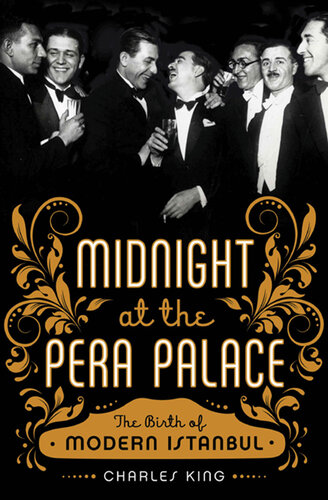
Midnight at the Pera Palace
The Birth of Modern Istanbul
کتاب های مرتبط
- اطلاعات
- نقد و بررسی
- دیدگاه کاربران
نقد و بررسی

July 14, 2014
Istanbul in the interwar years was a city in transition: the multilingual, multiethnic ancient seat of the Islamic caliphate and the Greek Orthodox Church became in half a generation an aggressively modern, secular Turkish metropolis, its gaze shifted from orient to occident. “The city whose very geography united Europe and Asia became the world’s greatest experiment in purposeful reinvention in the Western mold,” says King, professor of international affairs at Georgetown University. He tells the story of Istanbul through the eyes of the Pera Palace, the city’s most glamorous hotel and witness to assassinations, bombings, and the “intrigue... seemed to be the city’s common currency.” This is a case study in rapid social change, redolent of incense and gunpowder, a cultural biography of one of the few cities that can claim the title of capital of the world. King investigates the fate of eunuchs when the harem had been disbanded forever and explores how cinema overtook the traditional art of shadow puppetry. A diverse cast, ranging from Muslim beauty queens and Georgian royalty to Leon Trotsky, have left their mark on Istanbul, and King nimbly weaves their threads with enough color to draw in general readers and enough detail to satisfy specialists. Photos.

August 1, 2014
The Pera Palace, named after the fashionable Pera neighborhood in Istanbul, housed foreign soldiers during World War I and foreign spies during World War II. Over the years, the residence was the site of a murder, a suicide, and an explosion. Using the palace as a backdrop, King (international affairs, Georgetown Univ.) skillfully recounts the decline of the Ottoman Empire after Mehmed V declared jihad against the Allies in 1914. King describes how Britain, both Islamophobic and philhellenic, reapportioned the once-sizable Ottoman Empire, leaving Turkey a demilitarized power at the edge of Europe and using Malta as a penal colony. Under British rule, Istanbul became synonymous with vice, and Turkish nationalists nicknamed it "Byzantine Whore." Domestic upheaval, combined with the refusal of Parliament to acknowledge Allied forces while Mehmed lingered in house arrest, led to fervent support of charismatic soldier Mustafa Kemal, who declared Ankara as the country's capital (it was far from Allied forces in Istanbul), ended the sultanate, and founded the Republic of Turkey. The nation began a painful adolescence as Kemal--quietly supported by Lenin and the Bolsheviks--instilled patriotism and championed modernism yet enforced ethnic cleansing and exiled at will. King concludes with Turkey's difficult decision to stay neutral during World War II despite the number of Jewish refugees seeking asylum. Intriguing anecdotes of many Istanbul residents and visitors complete the narrative. VERDICT This satisfying read is highly recommended for anyone interested in war or religious history.--Stephanie Sendaula, Library Journal
Copyright 2014 Library Journal, LLC Used with permission.

























دیدگاه کاربران